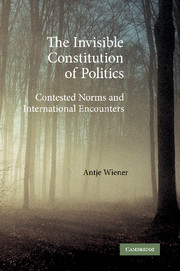Book contents
- Frontmatter
- Contents
- List of tables and graphs
- Preface
- 1 Introduction
- Part I Three theoretical moves
- 2 Constitutionalism beyond modernity
- 3 The dual quality of norms
- 4 Making normative meaning accountable for international relations
- Part II Case study: reconstructing the structure of meaning-in-use
- Part III Evaluation
- Annex
- References
- Index
3 - The dual quality of norms
Published online by Cambridge University Press: 22 September 2009
- Frontmatter
- Contents
- List of tables and graphs
- Preface
- 1 Introduction
- Part I Three theoretical moves
- 2 Constitutionalism beyond modernity
- 3 The dual quality of norms
- 4 Making normative meaning accountable for international relations
- Part II Case study: reconstructing the structure of meaning-in-use
- Part III Evaluation
- Annex
- References
- Index
Summary
It is hard to imagine any social scientist, even the most ardent methodological individualists among us, arguing with Searle's general claim that social facts are facts. Yet this fact tells us nothing about intentions as such, much less about their collective form or other properties.
(Onuf 2002: 227; my emphasis)Introduction
This chapter moves from the general framework of constitutionalism to the specific conceptualisation of norms. It takes the project of bringing in the customary dimension of the nomos with a view to examining the impact of the ‘hidden’ aspects of contemporary constitutionalism one step further. To that end, it recalls the main contributions to the literature on norms advanced by constructivist work in International Relations theory, including insights from conventional, consistent and critical constructivist strands. The following assessment of the role of norms and their hidden meanings – which add a degree of contestedness to international politics – builds on the juxtaposition of two fundamentally distinctive conceptualisations of ‘interaction’ in International Relations theory. The first approach evolves from a behaviourist understanding of strategic interaction. It holds that, as the dependent variable, government behaviour demonstrates a reaction to particular types of norms. Accordingly, interaction is both regulated and constituted by norms; norms are conceptualised as ‘social facts’ which structure behaviour (Ruggie 1998b); and the concept of a norm is used ‘to describe collective expectations for the proper behavior of actors with a given identity’ (Katzenstein 1996: 5). The second approach works with a reflexive understanding of interaction.
- Type
- Chapter
- Information
- The Invisible Constitution of PoliticsContested Norms and International Encounters, pp. 37 - 58Publisher: Cambridge University PressPrint publication year: 2008
- 1
- Cited by

